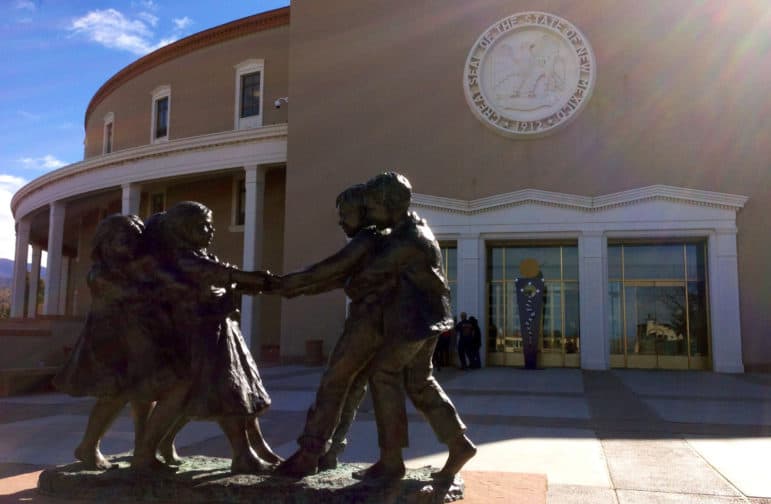
Heath Haussamen / NMPolitics.net
A statue outside the Roundhouse in Santa Fe.
A Senate panel approved a bill Thursday that would make it easier for state regulators to fine oil and natural gas producers for spills and other environmental violations. The bill, which advanced along party lines, follows years of sharp increases in the volume of spills involved in oil and gas production, and comes as major companies like ExxonMobil and Halliburton have shown a surge of interest in the Permian Basin of southeast New Mexico.
Democrats and environmental advocacy groups say the measure would give teeth to an agency they describe as defanged by a 2009 court ruling that stripped away some of its authority to impose penalties.
State data show a sharp drop in fines collected by the New Mexico Oil Conservation Division since the ruling. The agency collected $735,500 in penalties in 2009 but only $14,000 the following year, according to an analysis by the Legislative Finance Committee. Penalties have been rare since then.
The sharp decline followed a ruling by the state Supreme Court that said the division cannot on its own collect fines for violations of New Mexico’s oil and gas regulations.
Under the ruling, the department can only ask the attorney general to file a lawsuit against the company in the judicial district where a violation occurred.
A spokesman said the Attorney General’s Office does not have any record of the department asking it to pursue such fines or penalties.
And even if the state takes a company to court, the attorney general must then prove that the company acted knowingly and willfully.
“That makes no sense,” Sen. Richard Martinez, D-Española, said to the Senate Conservation Committee at Thursday’s hearing.
Senate Bill 307, sponsored by Martinez, would not just give the Oil Conservation Division, which is part of the Energy, Minerals and Natural Resources Department, the power to collect fines through administrative hearings rather than lawsuits. It also would remove the requirement that the state prove a company acted knowingly and willfully when it violated regulations.
Under the bill, which goes next to the Senate Judiciary Committee, fines for most violations will remain capped at $1,000 per day. But fines for spills or other violations that could pollute water beyond state or federal standards could go as high as $10,000 per day.
New Mexico’s fine schedule generally is less than what oil and gas producers face in other Western states.
Colorado in 2014 increased its maximum daily penalty from $1,000 to $15,000. Each violation in Texas can cost up to $10,000 per day. Oklahoma allows fines up to $5,000 for some violations.
Oil and gas companies, as well as industry groups, counter that regulators already have plenty of options besides fines to crack down on scofflaws. They range from suspending permits to prohibiting a company from selling the oil it pumps.
“These enforcement powers already provide a substantial deterrent,” Mike D’Antonio, a lobbyist for the New Mexico Oil and Gas Association, told the committee.
But the Legislative Finance Committee has found that the increase in oil spills in New Mexico has outpaced oil production in recent years. About 200 spills were reported in fiscal year 2011, and about 500 were reported in 2015. Oil production was up 23 percent in 2015, while the volume of spills grew 61 percent. The volume of oil spills, meanwhile, rose from around 7,000 barrels in fiscal year 2011 to more than 20,775 in fiscal year 2015. Spills fell by nearly 4,000 barrels in fiscal year 2016, but gas spills continued to rise, increasing by 31 percent, according to department data reported to the Legislative Finance Committee.
Despite statistics demonstrating what environmental advocates say is a need for stiffer enforcement, similar bills have failed in past years. State regulators have been silent on the latest measure by Martinez.
A spokeswoman for the Energy, Minerals and Natural Resources Department said its executives have not taken a position the bill.
And though the bill hinges on enforcement by the agency, no one from the energy department spoke during Thursday’s hearing. Instead, staff were conspicuously absent, even as senators asked questions intended for the department.
At one point, Sen. Bill Soules, D-Las Cruces, asked about nine fines assessed by the department but apparently not collected because the penalties have not been referred to the Attorney General’s Office.
“Seems like that’s an important question,” Soules said, looking out at the gallery. “But doesn’t seem like I’m going to get that answered.”
Contact Andrew Oxford at (505) 986-3093 or aoxford@sfnewmexican.com. Follow him on Twitter at @andrewboxford.